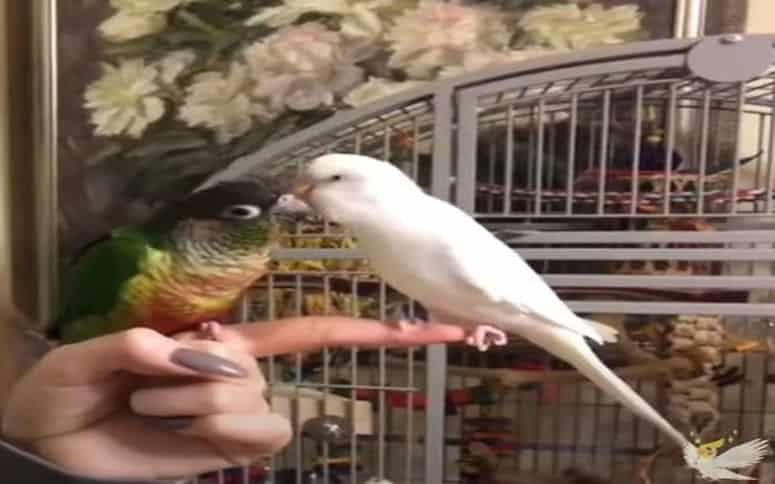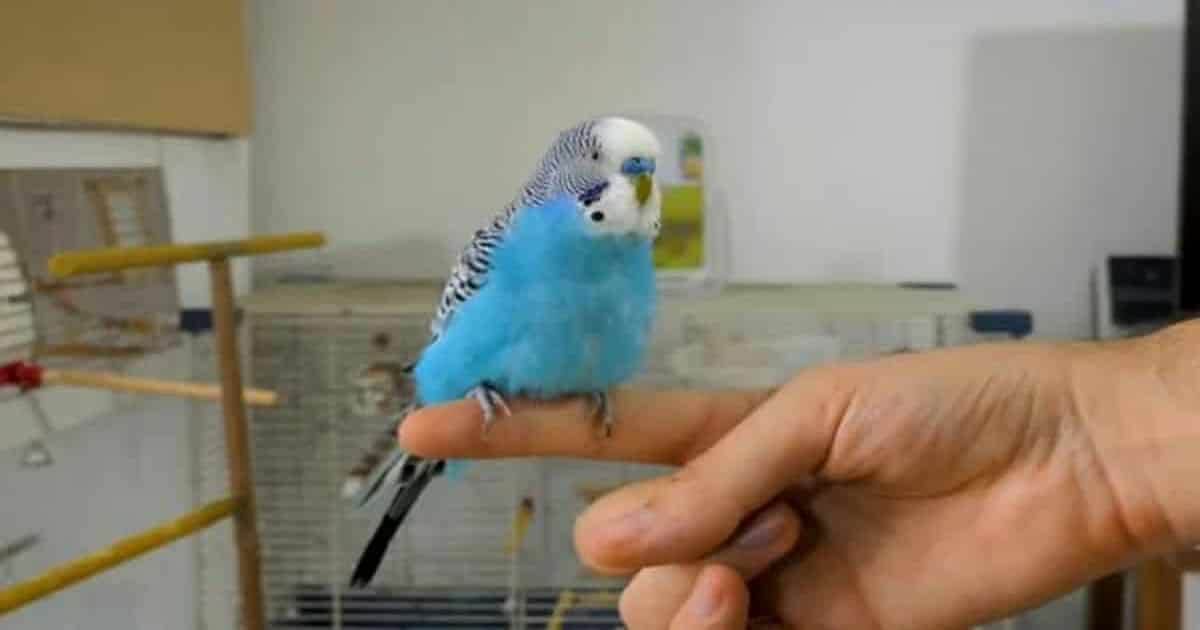How to Keep Budgies Warm in Winter?
Budgies, also known as parakeets, require special care during the winter months to ensure they stay healthy and comfortable. So, knowing how to keep budgies warm in winter is vital.
To keep budgies warm in winter, provide a consistent temperature in their habitat, place their cage away from drafts and cold areas, provide a bird-safe heat lamp, maintain proper humidity, and cover the cage with a fleece blanket at night for warmth.
In addition, ensure the budgie has enough food, including fruits and vegetables, and keep its living environment clean. By following these steps, you can keep your budgie safe and healthy during the winter months.
Scroll down to learn some practical ways to keep budgies warm in winter.
Do Budgies Need To Be Kept Warm In Winter?

Yes, budgies (parakeets) should be kept warm in winter, and there are several reasons for this:
- Natural habitat: Budgies are native to Australia, where they are accustomed to a warm and temperate climate. Their bodies are adapted to thrive in these conditions, and they are not well-suited for cold temperatures.
- Cold stress: Exposure to cold temperatures can cause stress to budgies, leading to health issues (including hypothermia and respiratory problems, and In severe cases, it can even be life-threatening). Also, cold stress can weaken their immune system, making them more susceptible to diseases. In addition, it can also affect their metabolism and digestion.
- Feathered insulation: While budgies have feathers to help regulate their body temperature, they are not as well-equipped as other birds to handle extreme cold. In the wild, they can seek shelter or fly to a warmer location, which is impossible in captivity.
- Chilling: Prolonged exposure to cold temperatures can lead to chilling, which can be harmful or even fatal for budgies. Chilling can cause them to become lethargic, puff up their feathers, and shiver, signs of discomfort and stress.
- Respiratory issues: Budgies are susceptible to respiratory problems, and cold air can exacerbate these issues. However, it can make them more prone to respiratory infections, such as pneumonia.
How To Keep Budgies Warm In Winter? Expert Technique

Taking care of a budgie (also known as a parakeet) in the winter requires some special considerations to ensure your pet’s well-being, as these birds are native to warmer climates.
Here are some tips for keeping your budgie comfortable and healthy during the colder months:
Set The Cage In A Place Away From Drafts
Drafts can cause your budgie to feel cold and uncomfortable. Place their cage in a warm and cozy area of your home, away from windows and doors.
Provide Adequate Lighting
During the winter months, days are shorter, and budgies require proper lighting for their well-being.
Ensure they receive at least 10-12 hours of light each day. You can use artificial lighting if necessary to meet this requirement.
Get A Bird-safe Heat Lamp
A bird-safe heat lamp can provide additional warmth for your budgie during colder days. Make sure to position it in a way that doesn’t directly heat the cage to avoid overheating.
Ensure Proper Humidity Levels
The ideal humidity level for budgies is between 40% and 60%. This range ensures that their respiratory system stays healthy and prevents their feathers from becoming too dry.
If the air in your home is too dry, it can lead to respiratory problems and discomfort for your budgie.
Consider using a room humidifier or placing a shallow pan of water near their cage to maintain optimal humidity levels.
Cover The Cage With A Fleece Blanket At Night
At night, when temperatures drop, cover your budgie’s cage with a soft fleece blanket to provide extra insulation. This will help them retain heat and stay cosy throughout the night.
Provide A Nutritious Diet

Proper nutrition is crucial for a budgie’s health, especially during the winter months. In addition, it helps boost their immune system and keeps them active and energetic. To ensure your budgie gets the right nutrients, follow these tips:
Increase The Amount Of Food Given To The Budgie
During the winter, budgies need more energy to keep themselves warm. Increase the quantity of food you provide to meet their higher caloric needs. Make sure the food you offer is fresh and of good quality.
Offer A Variety Of Fruits And Vegetables To Boost Their Immune System
Fruits and vegetables contain vitamins and antioxidants that help strengthen the immune system to budgies. Incorporate a variety of these foods into your budgie’s diet.
Some examples include:
- Carrots
- Broccoli
- Apples
- Spinach
These fruits and vegetables provide essential nutrients that can help keep your budgie healthy during the winter.
Offer Plenty Of Fresh Water
Hydration is crucial, even in colder months. Make sure your budgie always has access to fresh and clean water. Check it regularly to ensure it hasn’t frozen.
Maintain Regular Exercise
Encourage your budgie to exercise regularly by providing them with toys and perches. Exercise helps keep their muscles healthy and their metabolism active, helping them stay warm.
Monitor Their Behavior And Health
Pay close attention to changes in your budgie’s behaviour, appetite, or appearance. If you notice any signs of illness or discomfort, consult a veterinarian promptly.
Take Precautions During Power Outages
In a power outage, it’s essential to keep your budgie warm. Consider using a portable heat source, such as a hot water bottle wrapped in a towel, to provide temporary warmth until power is restored.
Maintain a Constant Temperature
Budgies are sensitive to temperature fluctuations, so it’s essential to keep their environment at a constant, comfortable temperature.
Ideally, the room temperature should be between 65-75°F (18-24°C). Avoid exposing your budgie to drafts, as cold air can be harmful.
Spend Quality Time With Your Budgie:
Lastly, don’t forget to give your budgie plenty of love, attention, and interactive playtime. Interacting with you will not only keep them mentally stimulated but also provide warmth and comfort.
Remember, each budgie is unique, and their needs may vary slightly. By following these tips and observing your budgie’s behaviour, you can ensure they stay happy and healthy throughout the winter season.
You can watch the video for more.
What Temperature Is Too Cold For Budgies?
Budgies are sensitive to cold temperatures, with anything below 65°F (18°C) considered too cold for them.
However, here are some guidelines to determine what temperature is too cold for these adorable pets:
- Below 65°F (18°C): Budgies are comfortable in temperatures ranging from 65°F to 85°F (18°C to 29°C). However, temperatures dropping below 65°F (18°C) can be too cold for them.
- Below 60°F (15.5°C): Budgies may start to experience discomfort and stress when the temperature falls below 60°F (15.5°C).
- Below 50°F (10°C): Budgies are extremely sensitive to colder temperatures, and anything below 50°F (10°C) can be dangerous for them. Prolonged exposure to such low temperatures can lead to hypothermia and other health issues.
To ensure your budgies stay warm and healthy throughout the winter season, follow the above tips.
Remember, the temperature requirements may vary slightly depending on the individual budgie and their acclimatization. However, it’s essential to monitor their behaviour and well-being closely during cold weather.
By understanding the temperature limits and taking appropriate measures to keep your budgies warm, you can ensure their comfort and health throughout the winter season.
How Do I Know If My Budgie Is Too Cold?

If you’re wondering how to tell if your budgie is too cold, look for signs like puffing up feathers or excessive shivering.
Here are some signs to look out for:
- Puffed-up feathers: If your budgie’s feathers are constantly fluffed up, it might be a sign that they are trying to keep warm.
- Shivering: Budgies may shiver when they feel cold, similar to how humans do.
- Decreased activity: If your budgie seems less active than usual, it could be because they are conserving energy to stay warm.
- Cold feet: Touch your budgie’s feet gently. If they feel cold to the touch, it indicates that they might be experiencing low body temperature.
- Seeking warmth: Watch if your budgie constantly seeks warm spots in their cage or perching close to a heat source.
Additional Winter Care Tips To Keep Your Budgies Warm

In addition to maintaining a suitable temperature and following the guidelines mentioned earlier, here are some additional winter care tips to help keep your budgies warm and comfortable during the colder months:
- Offer a variety of foods: In winter, you can provide your budgies with slightly more calorie-rich foods to help them maintain their energy levels. This can include offering a wider range of fruits, vegetables, and seeds. However, be mindful not to overfeed, as obesity can be a health concern.
- Offer warm water: Budgies may appreciate slightly warm water during the winter. Ensure their water is at room temperature and always refresh it regularly to prevent it from getting too cold.
- Bathing and misting: While you might not think of it in the winter, budgies still benefit from bathing. You can provide a shallow dish of lukewarm water for them to bathe in, or you can mist them lightly with warm water. However, this helps maintain healthy feathers and keeps them comfortable.
- Avoid sudden temperature changes: Budgies are sensitive to drastic temperature changes. Keep their cage away from heat sources such as radiators and fireplaces to prevent overheating.
- Keep an eye on their behavior: Monitor your budgies closely for any signs of discomfort or illness during the winter months. Look out for fluffed-up feathers, decreased activity, breathing difficulties, or loss of appetite. If you notice any concerning symptoms, consult an avian veterinarian immediately.
- Provide ample rest: Ensure your budgies have sufficient rest during the winter. Provide a quiet and calm environment for them to relax, allowing them to conserve energy and stay warm.
- Maintain regular veterinary check-ups: Regular veterinary check-ups are essential, regardless of the season. Schedule routine visits to ensure your budgies receive proper care, vaccinations, and necessary treatments.
Frequently Asked Questions Of How To Keep Budgies Warm In Winter?
What Do Budgies Need In Winter?
Do Budgies Feel Cold In The Winter?
Is it safe to use a heating pad or heat lamp in the budgie’s cage?
How can I keep my budgies active in the winter?
Sum Up
Winter can be a challenging time for budgies, but with a few simple steps, you can keep them warm and healthy.
By providing a cosy and insulated shelter, regulating the temperature in their environment, and offering warm foods and drinks, you can ensure their well-being during the colder months.
Remember to monitor their behaviour and make adjustments as needed closely. Your feathered friends will thank you for your care and attention as they thrive in a warm and comfortable environment.
Stay mindful of their needs, and enjoy the winter season with your happy and content budgies.







